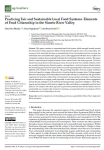Rico Mendez G., Pappalardo G., Farrell B. (2021). Practicing fair and sustainable local food systems: elements of food citizenship in the Simeto River Valley. Agriculture, 01/01/2021, vol. 11, n. 1, p. 1-22.
https://doi.org/10.3390/agriculture11010056
https://doi.org/10.3390/agriculture11010056
| Titre : | Practicing fair and sustainable local food systems: elements of food citizenship in the Simeto River Valley (2021) |
| Auteurs : | G. Rico Mendez ; G. Pappalardo ; B. Farrell |
| Type de document : | Article |
| Dans : | Agriculture (vol. 11, n. 1, January 2021) |
| Article en page(s) : | p. 1-22 |
| Langues : | Anglais |
| Langues du résumé : | Anglais |
| Catégories : |
Catégories principales 08 - ALIMENTATION ; 8.3 - Politique et Sécurité AlimentaireThésaurus IAMM SYSTEME ALIMENTAIRE ALTERNATIF ; GOUVERNANCE ; DEVELOPPEMENT DE LA COMMUNAUTE ; ALIMENTATION HUMAINE ; AGROECOLOGIE ; DEVELOPPEMENT DURABLE ; RECHERCHE ACTION ; ITALIE ; SICILIA |
| Résumé : | This paper examines a community-based food system which emerged recently around the Simeto River Valley Agreement (SRA) in Sicily (Italy) through the lens of food citizenship. The concept of food citizenship develops an understanding of how food systems function to ensure that individuals and communities have agency, access, and engagement with their food. It allows for comparative analysis between global/industrial and community/alternative systems. This paper follows a methodological integration between action research and a case study approach. The action research process produced a networked governance structure derived from multiple initiatives which are currently initiating many thematic projects—amongst them, a local food system. Results indicate that formalizing governance structures derived from self-organizing behavior have led to an inclusive platform with a shared vision and goals. The governing structures, however, require continued efforts and capacity to engage collaboratively in implementing their strategic plans. Findings suggest that actors developing a food citizenship-focused system should (1) consider how the governance organizational structure enables fluid communication among members and leads to building trust, (2) seek alternatives to engage youth (especially in rural areas) and promote citizen engagement, and (3) develop strategies to seek technical and programmatic support for initiatives. These three aspects are key features which may be adapted to other such efforts in sustainable and local food systems. The complex networked approach to governance presented here and the shared vision for sustainability are considered key elements in fostering a successful alternative food system with the fundamentals of food citizenship at its core. |
| Cote : | En ligne |
| URL / DOI : | https://doi.org/10.3390/agriculture11010056 |







